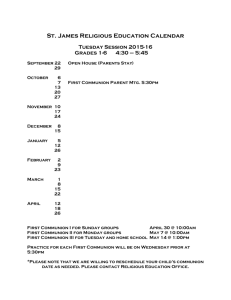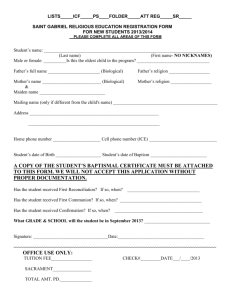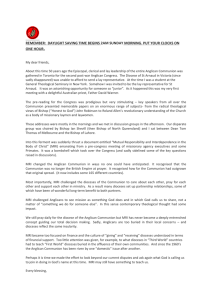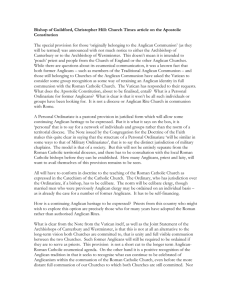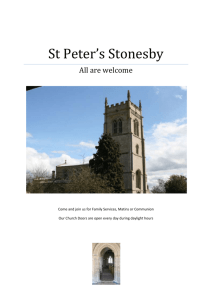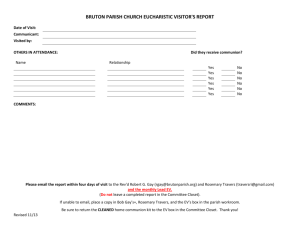Anglican-Roman Catholic Relations
advertisement
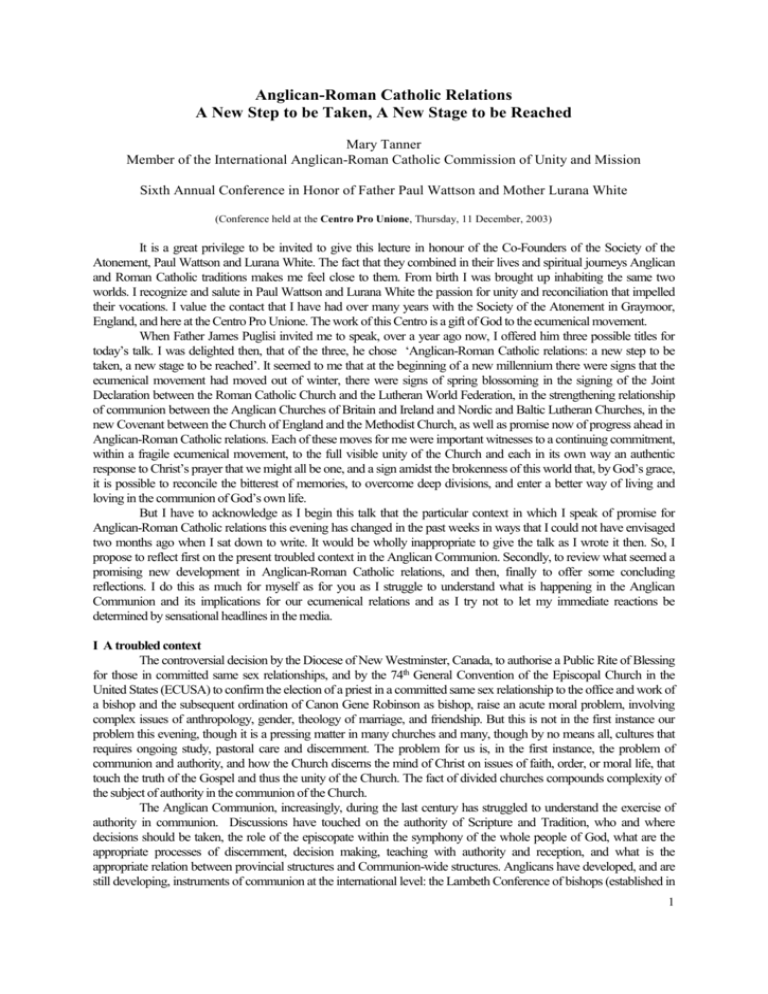
Anglican-Roman Catholic Relations A New Step to be Taken, A New Stage to be Reached Mary Tanner Member of the International Anglican-Roman Catholic Commission of Unity and Mission Sixth Annual Conference in Honor of Father Paul Wattson and Mother Lurana White (Conference held at the Centro Pro Unione, Thursday, 11 December, 2003) It is a great privilege to be invited to give this lecture in honour of the Co-Founders of the Society of the Atonement, Paul Wattson and Lurana White. The fact that they combined in their lives and spiritual journeys Anglican and Roman Catholic traditions makes me feel close to them. From birth I was brought up inhabiting the same two worlds. I recognize and salute in Paul Wattson and Lurana White the passion for unity and reconciliation that impelled their vocations. I value the contact that I have had over many years with the Society of the Atonement in Graymoor, England, and here at the Centro Pro Unione. The work of this Centro is a gift of God to the ecumenical movement. When Father James Puglisi invited me to speak, over a year ago now, I offered him three possible titles for today’s talk. I was delighted then, that of the three, he chose ‘Anglican-Roman Catholic relations: a new step to be taken, a new stage to be reached’. It seemed to me that at the beginning of a new millennium there were signs that the ecumenical movement had moved out of winter, there were signs of spring blossoming in the signing of the Joint Declaration between the Roman Catholic Church and the Lutheran World Federation, in the strengthening relationship of communion between the Anglican Churches of Britain and Ireland and Nordic and Baltic Lutheran Churches, in the new Covenant between the Church of England and the Methodist Church, as well as promise now of progress ahead in Anglican-Roman Catholic relations. Each of these moves for me were important witnesses to a continuing commitment, within a fragile ecumenical movement, to the full visible unity of the Church and each in its own way an authentic response to Christ’s prayer that we might all be one, and a sign amidst the brokenness of this world that, by God’s grace, it is possible to reconcile the bitterest of memories, to overcome deep divisions, and enter a better way of living and loving in the communion of God’s own life. But I have to acknowledge as I begin this talk that the particular context in which I speak of promise for Anglican-Roman Catholic relations this evening has changed in the past weeks in ways that I could not have envisaged two months ago when I sat down to write. It would be wholly inappropriate to give the talk as I wrote it then. So, I propose to reflect first on the present troubled context in the Anglican Communion. Secondly, to review what seemed a promising new development in Anglican-Roman Catholic relations, and then, finally to offer some concluding reflections. I do this as much for myself as for you as I struggle to understand what is happening in the Anglican Communion and its implications for our ecumenical relations and as I try not to let my immediate reactions be determined by sensational headlines in the media. I A troubled context The controversial decision by the Diocese of New Westminster, Canada, to authorise a Public Rite of Blessing for those in committed same sex relationships, and by the 74th General Convention of the Episcopal Church in the United States (ECUSA) to confirm the election of a priest in a committed same sex relationship to the office and work of a bishop and the subsequent ordination of Canon Gene Robinson as bishop, raise an acute moral problem, involving complex issues of anthropology, gender, theology of marriage, and friendship. But this is not in the first instance our problem this evening, though it is a pressing matter in many churches and many, though by no means all, cultures that requires ongoing study, pastoral care and discernment. The problem for us is, in the first instance, the problem of communion and authority, and how the Church discerns the mind of Christ on issues of faith, order, or moral life, that touch the truth of the Gospel and thus the unity of the Church. The fact of divided churches compounds complexity of the subject of authority in the communion of the Church. The Anglican Communion, increasingly, during the last century has struggled to understand the exercise of authority in communion. Discussions have touched on the authority of Scripture and Tradition, who and where decisions should be taken, the role of the episcopate within the symphony of the whole people of God, what are the appropriate processes of discernment, decision making, teaching with authority and reception, and what is the appropriate relation between provincial structures and Communion-wide structures. Anglicans have developed, and are still developing, instruments of communion at the international level: the Lambeth Conference of bishops (established in 1 1867), the Anglican Consultative Council of bishops, clergy and lay persons (established in 1968), and the Primates’ Meeting (established in 1978). These, together with the ministry of the Archbishop of Canterbury, the focus of unity and communion at the international level, are the ways by which the provinces of the Communion express their unity and communion and live out their interdependence. ‘They may not either individually or together take decisions on behalf of the whole Communion. They do provide the means of consultation, places in which to search for a common mind, and they provide the means for expressing the mind of the Communion’.1 While the autonomy of provinces entails the legal, juridical right, of each province to govern its way of life, in practice autonomy has never been the sole criterion for understanding the relation of Anglican provinces to one another. As Anglicans have reflected on their own instruments of communion they have been aware that the exercise of authority in the Anglican Communion is affected by the division of the churches and the inability to discern together in the communion of all the churches. Between the 1988 and 1998 Lambeth Conferences, the Inter- Anglican Theological and Doctrinal Commission explored the subject of koinonia and the structures and processes for maintaining communion. Its report to the 1998 Lambeth Conference, The Virginia Report, explored the web of structures, which hold together and guide a common life of belonging in the Anglican Communion. It raised many sharp questions about the exercise of authority in communion, including questions about the theological importance of a diocese which is reckoned to be the basic unit within Anglican unity; about the autonomy and interdependence of provinces; the authority of the Lambeth Conference and the binding character, or otherwise, of its resolutions; the inter-relation of the instruments of communion; and the role of the Archbishop of Canterbury in relation to individual provinces. The report ended: …by virtue of our baptism we are in a communion in the Holy Trinity and therefore with the universal Church. The long history of ecumenical involvement… has shown us that Anglican discernment and decision making must take account of the insights into truth and the Spirit- led wisdom of our ecumenical partners. Moreover, the decisions we take must be offered for the discernment of the universal Church.2 So, the Anglican Communion, like many other churches, is a Communion in via, struggling to understand how decisions are to be made, how communion is to be maintained when questions of truth and unity are posed and how to develop structures of belonging. In recent years issues in the area of order and moral life have only served to underline the urgency of the matter of the exercise of authority in communion. At the same time the discussions of authority in the Anglican-Roman Catholic dialogue have influenced, and continue to influence, the internal Anglican discussion. There has been a remarkable convergence reached, though not full agreement, in the area of authority in the Agreed Statements of ARCIC I, as was noted in the official responses of both Communions.3 The more recent statement, The Gift of Authority, has made further progress. It has posed very sharp questions about the exercise of authority, both in the Anglican Communion and the Roman Catholic Church. It is clear that, in different ways, neither Communion has it right. The questions ARCIC addresses to Anglicans in The Gift of Authority are in fact very similar to the questions Anglicans have already addressed to themselves in The Virginia Report.4 Anglicans are challenged to consider whether the Anglican Communion is open to the acceptance of instruments of oversight, which would allow decisions to be made that, in certain circumstances, would call for restraint or even bind the whole Communion. They are asked to consider to what extent unilateral action by provinces, or dioceses, in matters concerning the whole Church weaken communion, and how they may be open to participate in the sensus fidelium with all Christians. They are pressed about their willingness to tolerate anomalies even when these lead to impairment in communion. One might wish that these questions had been asked and answered many years ago and our lives ordered accordingly. But life is not so neat or comfortable. 1 ANGLICAN CONSULTATIVE COUNCIL, The Truth Shall Set You Free. the Report of the 1988 Lambeth Conference: The Reports, Resolutions & Pastoral Letters from the Bishops (London: Church House, 1988) 111. 2 The Virginia Report (Harrisburg: Morehouse Publishing, 1999) 51. 3 C. HILL and E.J. YARNOLD, (eds.), Anglicans and Roman Catholics: The Search for Unity (London: SPCK/CTS, 1994). 4 ARCIC, The Gift of Authority: Authority III: An Agreed Statement by the Second Anglican-Roman Catholic International Commission (London/Toronto: CTS/Anglican Book Centre, 1999). 2 In the situation of a Communion in change, struggling both internally and with ecumenical partners, to understand processes of discernment, decision-making and reception in the communion of local churches, a decision is taken by the Episcopal Church in the United States (ECUSA), for the sake of more credible witness in its own cultural context, concerning a matter on which all the bishops gathered at the 1998 Lambeth Conference had spoken, with all the moral authority that a Lambeth Conference has.5 It has no juridical authority. Resolution I.10 on human sexuality states clearly that the Conference ‘cannot advise the legitimising or blessing of same sex unions nor ordaining those involved in same gender unions.’6 The action of ECUSA, not surprisingly, precipitated a crisis in the Anglican Communion. Whatever one thinks about the issue itself, it is undeniable that in 1998 the bishops passed a clear Resolution on the subject of homosexuality. The immediate problem, therefore, both internally for Anglicans, and for our relations with the Roman Catholic Church is one of authority and communion. And Roman Catholics and other ecumenical partners will want to press on us the question – who now speaks for the Anglican Communion? In this ecumenical age there is no decision of one church that does not in some way touch ecumenical partners. The reaction of the Archbishop of Canterbury, even before the consecration of Canon Gene Robinson, was to call a meeting of the Primates of the Communion ‘to take counsel together, and to seek to discern, in an atmosphere of common prayer and worship, the will and guidance of the Holy Spirit for the common life of the 38 provinces which constitute our communion’. The report of that meeting acknowledged that the actions of New Westminster and New Hampshire threaten the unity of the Communion, affect relations with other parts of Christ’s Church, as well as our relations with other faiths. The Primates re-affirmed the Resolution of the Lambeth Conference in 1998 on human sexuality as having moral force and therefore commanding respect of the Communion, and they commend an on-going study on questions of human sexuality, in which the experience of homosexuals must be listened to. The Primates regretted ‘deeply’ the action of New Westminster which appeared to them to short circuit the process that the Lambeth Conference had called for, and to be an action unilaterally altering the position of the Anglican Communion. ‘Whilst we recognise’ they say, ‘the juridical autonomy of each province in our Communion, the mutual interdependence of the provinces means that none has authority unilaterally to substitute an alternative teaching as if it were the teaching of the entire Anglican Communion.’ They went on to say that the actions of New Westminster and in the Episcopal Church USA ‘do not express the mind of the Communion as a whole, and these decisions jeopardise our sacramental fellowship with each other’ - strong, clear words. The Primates in a pastoral role call on the provinces concerned to make adequate provision for episcopal oversight for dissenting minorities in their area in consultation with the Archbishop of Canterbury. The Primates met and reported immediately prior to the consecration of Canon Gene Robinson. They were clear: If his consecration proceeds, we recognise that we have reached a crucial and critical point in the life of the Anglican Communion and we have had to conclude that the future of the Communion itself will be put in jeopardy. In this case, the ministry of this one bishop will not be recognised by most of the Anglican world, and many provinces are likely to consider themselves to be out of Communion with the Episcopal Church (USA). This will tear the fabric of our Communion at its deepest level, and may lead to further division on this and further issues as provinces have to decide in consequence whether they can remain in communion with provinces that choose not to break communion with the Episcopal Church. The Primates, echoing a Resolution of the 1998 Lambeth Conference (Resolution IV, 13 b), called for the setting up of a Commission to consider the role of the Archbishop of Canterbury in maintaining communion within and between provinces when grave difficulties arise and that the remit be extended to include urgent and deep theological and legal reflection on the way in which the dangers they had identified will have to be addressed. They called for no 5 The 1920 Lambeth Conference had this to say: “The Lambeth Conference …does not claim to exercise any powers of control or command. It stands for the more spiritual and more Christian principle of loyalty to the fellowship. The Churches represented in it are indeed independent but independent with the Christian freedom which recognises the restraints of truth and life. They are not free to deny the truth. They are not free to ignore the fellowship…the conference is...a fellowship in the Spirit.” 6 The Official Report of the Lambeth Conference 1998: Transformation and Renewal, July 18-August 9, 1998, Lambeth Palace; Canterbury, England (Harrisburg: Morehouse Publishing, 1999) 381. 3 province to act precipitately and for all to engage in a lengthy process of reflection. Reactions to the consecration of Canon Gene Robinson continue, within the diocese of New Hampshire itself, within the Episcopal Church, within the Anglican Communion, and relations with some of our ecumenical partners have suffered in consequence. The strain on the Communion is clear. It will take more time to understand just what are the implications of what has happened, what the appropriate response should be to these events, and how, and whether, we can live in ‘restricted communion’, ‘impaired communion’, and what this might require in terms of structures of extended episcopal oversight. A Commission has been set up under the chairmanship of the longest serving Primate, Robin Eames. It is not for me top predict the outcome of that Commission’s work. I felt it important to remind myself, and all of us, of the struggle in the Anglican Communion, painful as it is. The present crisis takes place in a Communion, which has long sought to understand authority and ecclesial communion, both in its internal reflections and in light of its on-going discussion of authority with the Roman Catholic Church. There have been, to borrow a title of a recent book, ‘two trains running’, not I believe, as the author argued on divergent lines but on remarkably converging lines. Developments have been made in the Anglican structures of discernment, decision making and reception over the last 100 years and are still developing. We have identified, both in our own discussions, and in conversation with the Roman Catholic Church, matters that urgently require study and action. Whenever I reflect on the discussions on authority in communion what strikes me immediately is that our two Communions have much to learn from one another both in terms of their strengths to be shared but also their weaknesses to be avoided. The Gift of Authority is clear both about those strengths and those weaknesses. And it seems to me, to quote the title of another book, co-authored by a Roman Catholic Archbishop and an Anglican bishop, it would be '‘Better Together'’. It is a scandal that we are not in eucharistic communion. It is a scandal that in matters of faith, order and moral life, we do not discern or decide, or teach together. But there is another side to the events of the last few months, which reveals the closeness of Anglican-Roman Catholic relations. Even before the Primates met, when Archbishop Rowan visited the Holy Father, here in Rome, the Pope gave a stern warning about ‘new and serious difficulties which extend to matters of faith and morals’. I took that warning as an indication of the closeness of relationship. The Holy Father cares about the relationship of our two Communions and understands it as close enough for the truth, as he perceives it, to be spoken in love. Warnings there were, but there was also warmth captured in that picture of the Holy Father kissing Archbishop Rowan’s ring, a ring given to another Archbishop, Archbishop Michael Ramsey by another Pope, Pope Paul VI, and treasured by Archbishops of Canterbury ever since. The events of the last days seem to me to speak the same message, a message of warning and warmth. The decision, which came from a meeting here in Rome between Cardinal Kasper and Canon John Peterson, the General Secretary of the Anglican Communion, not to call off the meeting of ARCIC in February, was a welcome one. In no way did their response mean a ‘collapse’ in the ARCIC dialogue, as one newspaper suggested. Their other decision to suspend some, though not all, of the work of the International Anglican Commission for Unity and Mission, a Commission that accompanies the work of ARCIC, is both understandable and, at the same time, a reason for sadness. I shall return to this later. One hopeful sign, however, a sign of our closeness, seems to me to be the response that Cardinal Kasper has given to the request of the Archbishop of Canterbury that an Anglican-Roman Catholic ad hoc sub group of IARCCUM should reflect on the ecclesiological issues raised by recent developments within the Anglican Communion, particularly in the light of the Agreed Statements of ARCIC on Authority, and that this group should accompany the Anglican Communion during its own internal processes of discernment. It seems to me that the leader in The Tablet last week was absolutely right to suggest that ‘The fact that the Archbishop of Canterbury has enlisted the Roman Catholic Church to help it determine its future shape is in itself a vindication of ARCIC’ I would add that it is a witness to the closeness of our two Communions. We have travelled far together in the last 45 years not least of all in understanding communion and how it is to be maintained. We cannot say ‘I have no need of you’. This is, in The Tablet’s words, ‘a moment rich in danger and opportunity in equal measure.’ It is in the context of ‘a moment rich in danger and opportunity in equal measure’ that I re-call the new initiative begun at the beginning of the new millennium in Anglican-Roman Catholic relations, and is still there even if its coming to fruition may take longer than some of us had hoped. The new initiative for a new millennium stems directly form a unique meeting of 26 Anglican and Roman Catholic bishops from around the world in Mississauga, Canada, in May 2000. The meeting was called together by Cardinal Cassidy and Archbishop George Carey, with the blessing of the Holy Father. 4 II A Possible next step to be taken, a next step to be reached In order to understand the Mississauga meeting we need to go back to those heady days after Vatican II. In 1966 Pope Paul VI and Archbishop Michael Ramsey issued their Common Declaration in which they spoke of a new atmosphere of Christian fellowship between the Roman Catholic Church and the Churches of the Anglican Communion – ‘ a new stage in the development of fraternal relations, based on Christian charity, and of sincere efforts to remove causes of conflict and to re-establish unity’. They announced plans to inaugurate a serious dialogue, not only on theological matters, but also one that faced honestly matters of practical difficulty’. Two years later a preparatory group produced the Malta Report charting a way forward for Anglican-Roman Catholic relations in the future The Malta Report laid out a plan for what we might call, ‘phased rapprochement’. Anglicans and Roman Catholics would move together by taking steps, entering new stages of committed relationship on the basis of explicit agreement in faith. A first stage had already been recognised by the Pope and the Archbishop in their Common Declaration. A second stage of closer relationship lay in the future. It would begin with an affirmation and explicit recognition and acknowledgement of one another, supporting binding commitments to intensify relationships and to act together. This second, officially recognised stage, would lead to a third and final stage in the quest for ‘full organic unity of our two Communions’. What strikes me looking back at the Malta Report is its firm commitment to organic unity as the goal, the intention to move to that goal by taking steps into clearly marked, and officially sanctioned, new stages of relatedness, as well as the expressed intention to keep theological and practical progress together. But what happened after Malta? The theological dialogue of ARCIC I made extraordinary progress in three areas – eucharist, ministry, and authority. The Final Report (an unfortunate title) was published in 1982 and sent to the two Communions with two questions: first, whether the agreed statements were ‘consonant in substance with the faith of Anglicans/Romans Catholics’, and, secondly, what were the next 'concrete steps’ that ought to be taken on the basis of these agreements. These two questions were faithful to the Malta vision keeping together the theological and the practical. But there was an almost total failure in both Communions to see the point of the two questions being harnessed together. Almost all attention was given to answering the first theological question and very little response to the second. Of course it’s much less threatening to answer a disembodied theological question than to face up to the renewal in life and the changes in relationships that those agreements demand. There was, it seems to me, a lack of imagination and a loss of the original Malta vision. What in fact happened was the inauguration of ARCIC II and another twenty years of intense theological conversation in which, undoubtedly, important documents were produced on justification, ecclesiology, morals, authority and we now look forward to an agreed statement on Mary in 2004 which will conclude work on the agenda identified in Malta, 35 years ago. Some hoped that the completion of this phase of theological conversation would lead to a return to an emphasis on the sort of changed relations that would be appropriate as a result of the all the theological conversation and obvious convergence in many areas. This was something of the context in which Archbishop George and Cardinal Cassidy called for an extraordinary meeting not of bishops. The responsibility was to pass now from the theologians to those who have a special ministry for the unity of the Church. The bishops came, two by two, from 13 regions of the world. There were only a few non-episcopal figures present. Jean- Marie Tillard, two women facilitators and 4 members of staff. Cardinal Kasper, who was to succeed Cardinal Cassidy as the head of the Pontifical Council, was also there. The bishops were to review where we are now and where we might go next in Anglican-Roman Catholic relations, in the light of the imperative for reconciliation and mission in a divided world. The meeting was held in an atmosphere of prayer: a day’s retreat that ended in renewal of baptismal vows and daily eucharists, presided over by an Anglican one morning and a Roman Catholic the next – a learning experience in itself for some, as they discovered in a very direct way how close our two liturgical traditions are. There was an immediate sense of commonality, of belonging to one another in the communion of the eucharist, in spite of the shared pain of not being able to receive together. The dynamic of the meeting was very simple indeed. This was not a paper driven meeting but an experience driven meeting. It began with the bishops in pairs walking in the garden reflecting on their own experience of AnglicanRoman Catholic relations on the ground. One of the few papers the bishops had in advance was a collation of answers given by the different regions to questions about the degree of co-operation in their part of the world. It was fascinating to watch how some pairs of bishops knew one another well while others had hardly met and had very few stories of cooperation to tell. The bishops listened to a number of paired stories of co-operation: in Northern Ireland, Papua New Guinea, New Zealand, Nigeria. What was soon clear was how much was happening in some regions and practically nothing in others. Quite quickly from the review of lived relations many of the theological issues were on the table; 5 eucharistic sharing, the recognition of ministries, authority in moral decision-making. There was also an overwhelming sense of the need to be together in mission and action especially in those parts of the world where Christian witness is hard in the midst of other faith communities, there were stories of good practice and stories of what to avoid. It was in the light of the actual experience of Anglican-Roman Catholic relations that the bishops turned next to review the theological work of ARCIC and the responses of the two Communions to ARCIC I. Then came the one substantial theological paper of the whole meeting given by Jean-Marie Tillard on the theme: ‘Our goal: full and visible communion’ It was a moving paper in which Father Jean captured the vision that motivates the work of ARCIC, made all the more moving as Jean was in the last months of his struggle with cancer. He had mustered all the strength he could to give, it seemed, a farewell message to the bishops. He insisted that it was now possible, on the basis of the agreements of ARCIC, to realise a new stage ‘an evangelical stage of Koinonia in which the gifts preserved and developed by each tradition would be at the service of both the Anglican and Catholic Churches, with official approbation’. ‘ I firmly believe’ he said ‘that without being totally healed, the schism dividing our two communions may and must be shrunk, diminished. By this affirmation I mean that some official bridges may and must be constructed over our disastrous division.... We cannot wait until the obstacle created by the ordination of women is removed.’ ‘An official step forward is now possible’ he insisted ‘But if we really want it, do we really want also to pay the price?’ and he ended ‘Words are not sufficient: we need decisions’. The bishops left Mississauga with a statement,‘Communion in Mission’, and an action plan for the future. They acknowledge the ‘degree of communion’ that already exists, which is no longer to be viewed in minimal terms…We have moved much closer to the goal of full visible communion than we had at first dared to think’. They mention honestly the unresolved differences and challenges – among them, the way authority is exercised, the nature and role of a universal primate, Anglican Orders, the ordination of women, moral and ethical questions. They suggest: now is the appropriate time for the authorities of our two Communions to recognise and endorse this new stage through the signing of a Joint Declaration of Agreement. This Agreement would set out: our shared goal of visible unity; and acknowledgement of the consensus in faith we have reached, and a fresh commitment to share together in common life and witness. Our two Communions should be invited to celebrate this Agreement around the world. (para.10) The bishops called for a group to be set up to oversee the preparation of a Joint Declaration. They were clear that a Declaration would mark a new stage on the way to full and visible unity. The Mississauga meeting was important for many reasons. It saw the responsibility for Anglican-Roman Catholic relations pass from theologians to bishops. It returned to the intention of Malta to take a new step and move into an officially recognised new stage of relationship, a stage of evangelical koinonia, as Tillard called it. It held together theological agreement and praxis, and it called for something to be done now. It enthused at least a few bishops, some of whom went home and began putting into practice in their own episcopal areas some of what they had learned at Mississauga. And a new international Commission for Unity and Mission IARCCUM was set up whose primary task is to prepare the Declaration called for by Mississauga: a Declaration that would be the way into a new intensified relationship of Anglicans and Roman Catholics in every part of the world. The Commission of bishops was set up and is well on with the preparation of a Joint Declaration, which banks what it can of the theological work of ARCIC, and, on the basis of that, the two Communions will be invited to make certain acknowledgements about each other’s ecclesial life as well as affirm binding commitments to live an intensified shared life at local and wider than local levels. One further effect of a Joint Declaration might be that both Communions would agree not to make decisions in the areas of faith, order or moral life, without official consultation and a clear understanding of what it would mean for the other to do so. As a lay woman I also want to stress how vital it is for the laity that all the theological talk is seen to have ‘cash value’, that it does find expression in officially sanctioned and encouraged ways of living together. In the early 1980’s it was very easy to enthuse parishes and dioceses with the work of ARCIC. There was a genuine excitement that things were about to change. But with practical results so long in coming, either the laity take the law into their own hands, or they give up on the ecumenical movement. It is very much harder to get an enthusiastic response now. III Concluding reflections The theological conversation of ARCIC will continue with its work on Mary, and plans will be made for where the conversation should go next. The wok of the Sub Commissions of IARCCUM will proceed, even if the hopes for a Declaration that would lead to a new step being taken an new stage of evangelical koinonia being reached, 6 will be put on hold – put on ice like good champagne, ready to be drunk when the time is judged to be right. In the ecumenical pilgrimage there are set backs but what has been gained remains there to be picked up, harvested, when the time is right. What is important now is that Anglicans and Roman Catholics keep talking. We need one another even more than ever. We need to explore together the ecclesiological implications of what has happened and we need to explore them in the light of the work of ARCIC on authority in communion and the responses of our two Communions to that work. I hope that when the new stage of evangelical koinonia does come about we shall have reached a deeper understanding through our standing together now of how a united Church might be a genuine communion of discernment in which those with a ministry of memory, the bishops, in, with and among the whole people of God, like a symphony, become a genuine communion of discernment, exploring controversial issues, with a clearer understanding of the value of legitimate diversity, on the one hand and requiring restraint and deferring to one another in love means on the other, as we comer to a common mind, the mind of Christ for the Church, in areas of faith, order and moral life. This will mean understanding better than either of our Communions does now the relation between the local and the universal Church. The Primates ended their statement: ‘It is clear that recent controversies have opened debates within the life of our Communion which will not be resolved until there has been a lengthy process of prayer, reflection and substantial work in and alongside the Eames commission. We pray that God will equip our Communion to be equal to the task and challenges that lie before it.’ The willingness of Roman Catholics to accompany that process through the ad hoc group is at least a comfort to an Anglican who longs to live ‘beyond Anglicanism’ in that visible communion to which ARCIC has always been committed and towards which it seemed, when I accepted the invitation to speak tonight, we might soon take a significant step and enter a new stage of relationship, reviving the way that Malta envisioned in the heady days after Vatican II. This wasn’t the talk that I had planned to give but it seemed to me to be dishonest not to face the reality of the situation, a situation that is indeed ‘rich in danger and opportunity in equal measure.’ I take heart from Cardinal Kasper’s words to the Bishops gathered at Mississauga: In our ecumenical efforts we should keep in mind that one day we will rub our eyes and be surprised by the new things that God has done in his Church. It is true that in the course of history we have done much against love and unity, but God – this is our hope – will make things good again. 7

